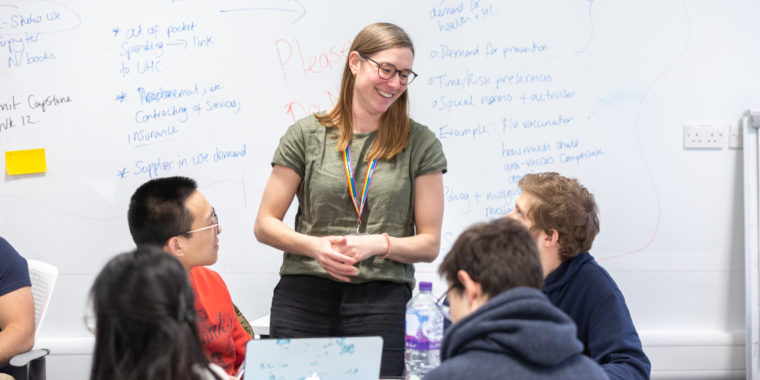
Observation by lecturers
All Change Makers modules are designed to be responsive and dynamic. This means that the exact activities that you complete in class, and the way that the module is designed is flexible and can be adjusted to best suit you as an individual student and your class as a group of students.
This is a very exciting way to approach learning and teaching, but it requires careful monitoring and consideration throughout to ensure that we make good choices. We want to make sure that you have enough support to tackle the things you find most difficult, and enough challenge to push you further on the things that you find easier. These choices are not the same from group to group, so it is really important that we get to know you and your class as well as we can.
For this reason, we engage in continuous observation during classes. We will pay attention during class discussions to remember what has been said and follow this up at a later point. We might join in with your group working discussions, or just listen in to see how you are getting on. We might watch how people are getting on – are people interested, bored, working through problems quickly or taking more time than we anticipated. We will also observe how you are working online by reviewing your contributions in our virtual classroom. We can see how you are working as a team, how you are putting ideas together, and how you are approaching completing your work.
Observation in the campus or online classroom
Obviously, when we meet in a real classroom, it is really easy for us as teachers to observe you working. We overhear snippets of conversation as we walk around, and we can see you all working around the room.
In the online classroom, things are a bit more tricky. We will make lots of use of video, and once the class has started and everyone is working, we will have a video meeting running that you can re-join so that you can ask us questions face to face. We might also ask you to invite us to your team video meetings – not because we want to take over your meeting, or because we are judging you working, but because we genuinely want to see how you are getting on. We might drop in for a minute, or we might stay longer.
For both on campus and online classes, we ask that you make full use of the features of our virtual classroom on Basecamp – especially the team and class chat functions.
Eavesdropping isn’t a bad thing – again, we are not judging you or just being nosey. We want to hear (or read) how you are getting along. Do you understand the task? Is your team getting on ok?
That way, if we see you going adrift, we can step in and help before any time is wasted. We want to support you every step of the way during our time together, but we need you to help make yourselves and your work as visible to us as possible.
All this observation means that we can offer you choices on how to proceed with the module, and make adjustments to make sure that the module is offering you the best experience that it possibly can.
Improving modules over time
As well as using these observations in real-time to help you and your classmates specifically, we also review these observations within our teaching team to make changes to the modules for the following year. In this way we can continuously respond to your feedback and experience to improve the modules for future students. Furthermore, we can sometimes share these observations more widely across college to help other modules and departments improve their student experience.
When we use our observations in this way, we do not talk about individual students, and if we want to share an example of something that happened or something that you said, we do this anonymously, without identifying you.
Of course, if we want to share something amazing that you have done, we want you to take credit for this. In this case, we will always contact you to ask your permission to share your work or your experience.
Sharing our module insights beyond our team
From time to time, we might want to publish material based on our modules – or even use our teaching data and experience to conduct research. Where this research involves your participation in the class, we will always seek ethical approval for the research and contact you for your consent to be included. We will provide lots of information about the research we want to do, and offer you the opportunity to either consent or withhold consent. We do not have any expectation about whether you want to participate or not – there are absolutely no hard feelings if you do not want to consent. Most of our research is conducted following the teaching, using the observations that we made to assist you in the classroom for the secondary purpose of research. This means that you already know what has happened in the classes and whether you are happy for us to use that information in an anonymised form for research purposes. This also means that our classroom time together is finished, all your assessment is complete and there is no crossover between your learning experience with us and our process of completing the research.
Other types of research might also be conducted, including interviews or focus groups, but these would not rely on classroom observations and would not involve the use of pre-existing data. In these cases you would be invited to participate and given all the appropriate information as a separate process to your learning experience with us.
In summary, our observations include:
– Things that we see and hear in the virtual classroom
– Examples taken from your work in progress or your final submission in the virtual classroom
– Data from the virtual classroom about how you have been working – such as your engagement in different areas of the classroom
– Comments or questions that you have made or asked in person or via email
Observation by external individuals
The Change Makers modules are very different to a standard learning and teaching experience, and we have won both student-nominated and international education awards for the design and delivery of the modules. This means that other people are often very interested to come and experience what happens in a typical class.
You might see teaching staff from across College sitting in for a class, or even international guests who have travelled from around the world to observe a class.
These guests are not observing you as individuals, and are not judging you in any way. They have come to try and understand how our modules work, and to experience and understand a little bit of what you are experiencing in the class.
We will always introduce the guests, and give you as a class an opportunity to bring them up to speed on how the class works, and the specifics of your work. You are very welcome to talk to the guests if you would like to do so. However, if you don’t want to talk to them, this is absolutely fine too.
Observation by you
With all this observation going on, it would be a shame if you were to miss out on joining in. There are lots of ways that you can observe other students to help improve your own learning and experience in the class.
If you pay attention to what is going on around you, take an interest in the work of other students and share how you are getting on, you will have a much richer learning experience. Learning from your fellow students, or peer learning, is one of the most important and enduring ways to learn in class. Seeing how other students approach their individual work or seeing how another team is collaborating can provide you with valuable insights into good practice and into your own approach.
Sometimes you will see something that is an excellent example of how to do something. You could try to incorporate something of this into your own approach. Sometimes you might see something that is an ineffective way of working – this might give you the opportunity to avoid following that same path or making that mistake. As long as you are not copying the work of another student, there is nothing wrong with learning from those around you. Take inspiration from what you see and you’ll soon find that you’re inspiring other students too.
Our use of classroom photos
We love taking photos of you working in class – and we love to see any photos that you take. Photos can be a great way to reflect on what is happening as we are working – sometimes reviewing a photo can reveal how we are using certain skills or can show us that we are actually doing something better than we thought we were.
As teachers we have found that showing photos from class (perhaps from a previous week’s class), can help us to move an activity or area of learning forwards, opening up discussion and helping you to progress.
We also find photos really useful to promote our modules – as you know, it can be hard to imagine what a Change Makers class is like – so seeing a photo of a class in action is really helpful.
Sometimes we might also want to use photos to illustrate a talk or publication about our work with students.
If we want to use any photos as the basis for a piece of research, you will always be contacted specifically about this. You will be informed about the nature of the research and then offered the chance to consent or withhold consent (depending on the consenting process being used).
We will only use photos that you have had the chance to review and consent to being used. For this reason, we have a photo stream in the classroom on Basecamp where we post every photo that we take – and we would encourage you to post photos there too! We especially love to see photos of things that we might not see – such as you working privately in your teams, or working outside the classroom! We even love to see our students meeting up for social reasons outside of class – we’re thrilled that the friendships you make by meeting in class can take on a life of their own after hours.
You are very welcome to let your teacher know if there is any photo that you do not want to be kept and potentially used. All you need to do is Ping your teacher, and we will delete the photo from the stream ensuring that it is not kept or seen again.
Last Updated 24th September 2023
